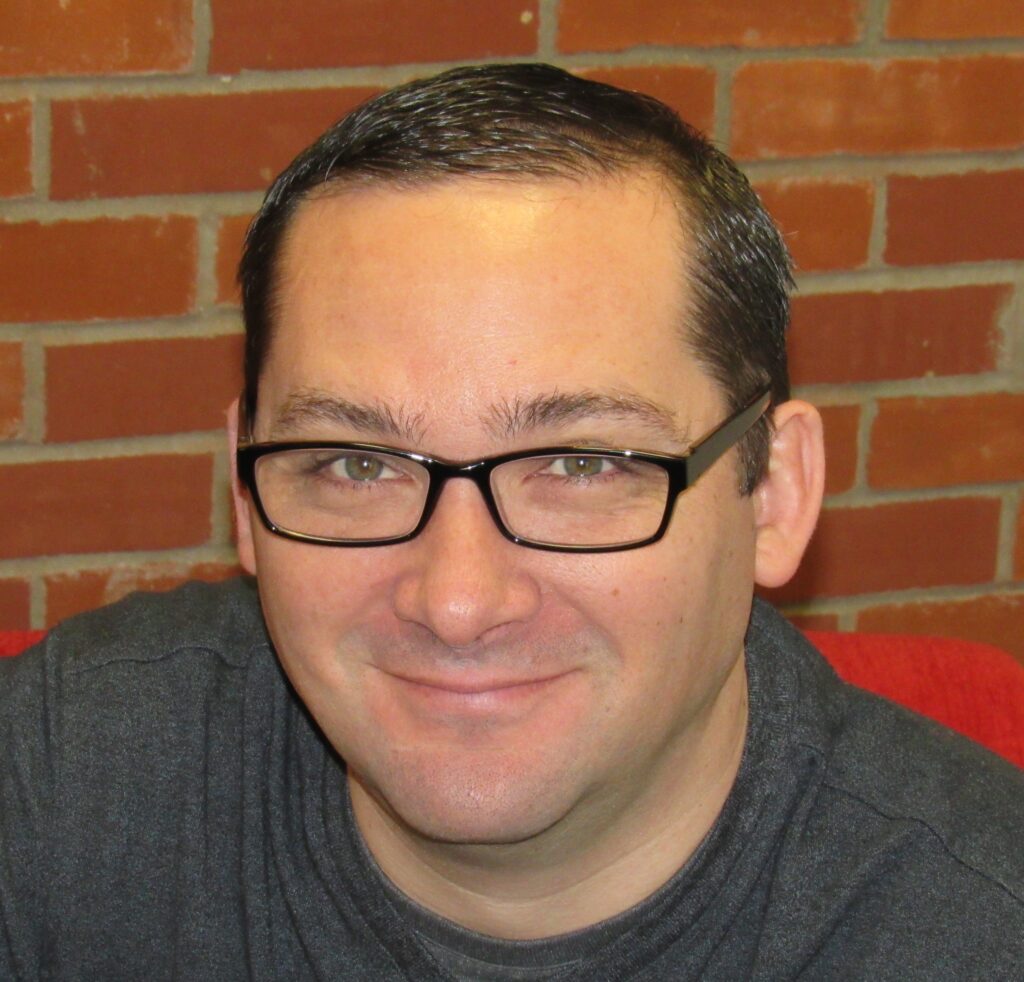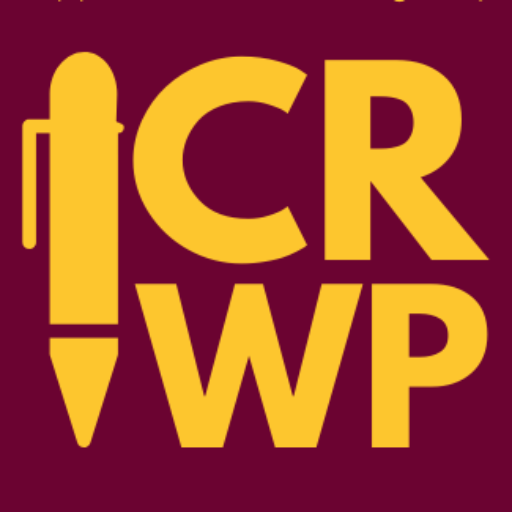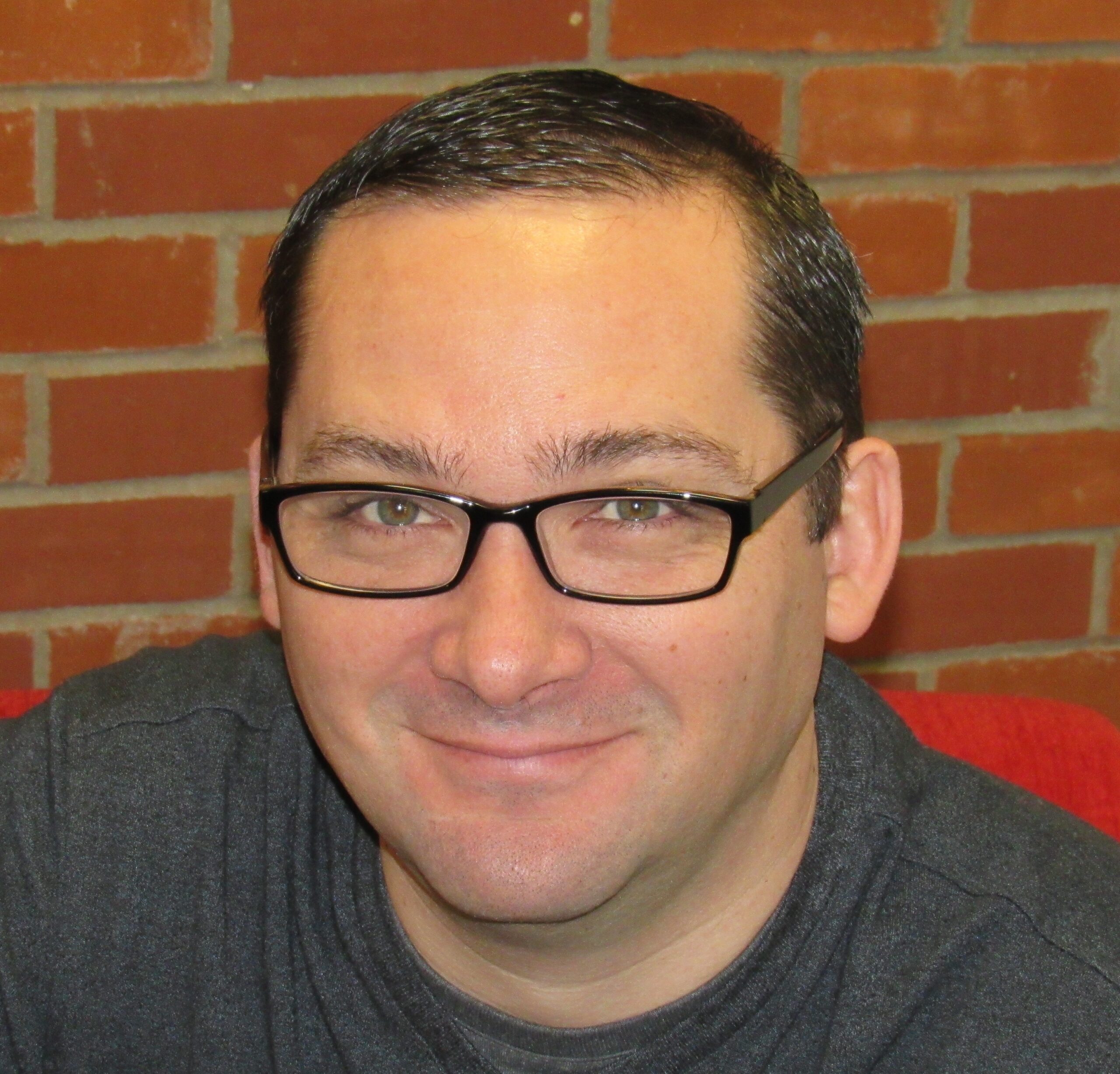Andy Schoenborn
Pioneer High School, Clare

In his own words…
We asked Andy about the impact of the CRWP, his advice for new teachers, and his current work as a writer. Here is what he had to say.
On the impact of the CRWP in his teaching and writing life…
In my 13 years with the Chippewa River Writing Project, many significant moments have occurred over the years. The summer institute taught me to be comfortable calling myself a writer and the phrase, “I am a writer,” was our mantra. Troy asked us to dream big and we were able to invite Jim Burke to join us for an intimate Saturday of learning on CMU’s campus. From Jim, I learned what a writing workshop looked like in real-time and my pedagogy evolved.
Learning, writing, risk-taking, and growing alongside other teacher-writers are the biggest professional draws for me. The writing project has helped me in various ways to take risks. Without teacher-writer friends in my life, I wouldn’t have had the courage to propose sessions and attend the NCTE annual conference over the past eight years; few would have encouraged me to seek leadership positions with other literacy organizations; and I wouldn’t have needed the nudge I needed to become a published author.
Of all of these experiences, the one that stands out the most is when CRWP leaders and I took actionable steps by doing the work of crafting our Land Acknowledgement statement.
On the surface it may seem like a simple statement, however, Dr. Sharon Murchie, Ana Contreras, Megan Kowalski, Becky Schwartz, and I spent over eight months digging into the Indigenous history of the land currently called Mount Pleasant, Michigan; exploring primary source documents from Indigenous and White perspectives; and crafting the language in our statement with the guidance of the Native Governance Center (nativegov.org). Our work culminated in a collectively sobering and personally reflective expedition to the Mount Pleasant Indian Industrial Boarding School where we witnessed the horrible measures White people took to ensure the assimilation of the Ojibwe people. In our research, we gained a profound respect for the labor, loss, and trauma experienced by the Ojibwe people as well as those who identify as BIPOC. We understood what it means to “do the work” and not rely on others to inform our actionable stances as an organization.
On his current professional writing life…
In July 2022, “A Spark of Light in the Darkness: A Framework of Habits and Routines that Grow Literacy Identities” was published in the Michigan Reading Journal (https://scholarworks.gvsu.edu/cgi/viewcontent.cgi?article=2847&context=mrj). The piece itself demonstrates the ability to loop literacy habits and routines daily, weekly, quarterly, and each semester that has moved students from “hating reading and writing” to becoming practicing student-readers and -writers who are excited to show people outside of the classroom what they are reading and writing.
As a teacher-writer, it gave me the opportunity to showcase the power of these promising practices for all students as my alternative education students, in their words, “climbed mountains” regarding their literacy growth through the unlearning of ineffective pedagogy via textbooks and packets and the discovery of learning with agency, choice, and personal relevancy. It turns out that teachers can work within the confines of outdated curriculums to provide relevant and engaging learning experiences.
In June 2020, “Creating Confident Writers: For High School, College, and Life” was published with W.W. Norton and coauthored with Dr. Troy Hicks (https://www.amazon.com/Creating-Confident-Writers-School-College/dp/0393714160). As my first step into writing and publishing a book I learned, with much more nuance, the power of being a teacher-writer. After its publication, I am much more prepared to write beside students and feel comfortable sharing the joyful struggle of writing a lengthy piece and seeing it through to its completion. I learned how to help students move their pieces from first-draft thinking to true revision, in which a writer lets the writing guide them, to meaningful conferencing with the audience in mind to publishing in authentic ways. One of the strategies highlighted in the book is “Featured Poet Friday.” After conferring, revising, and editing, some students are invited to share their work in front of the class and on our “LiveWrite” (https://livewrite.edublogs.org/) blog page where their work is shared via social media and archived.
In May 2022, “The Freedom to Read in Michigan,” was published jointly between the Michigan Association for Media in Education (MAME), the Michigan Council of Teachers of English (MCTE), and the Michigan Reading Association (MRA) (https://michiganreading.org/resources/Documents/MAME%20MCTE%20MRA%20Freedom%20to%20Read%20Statement.pdf). Given the nature of book banning and censorship that is working its way into school districts in Michigan and around the nation, the joint statement was an empowering effort between all three organizations. As a co-President of MCTE, President-Elect of MRA, and coauthor, it was a collaboration I was proud to be invited to join. The piece focuses on the principles of diversity, literacy, censorship, and intellectual freedom as it relates to the rights of students, parents, caregivers, school librarians, teachers, administrators, and school board members.
Writing in each situation is different, but equally rewarding. I am able to share the promising pedagogies my students and I lean on; I am able to write to learn using in-depth research with a friend and colleague; and I am able to collaborate with multiple statewide literacy organizations to take a stance in support of intellectual freedom for students in Michigan.
Advice for new teachers…
Practice what you teach — and share.
Have you tried the assignments you give your students? Have you rolled up your sleeves and worked collaboratively with them? Have you shared your struggles and successes with students, colleagues, and at conferences? Give it a try! When you “practice what you teach” you take the first steps of becoming a teacher-writer.
It’s through experiences and writing about them that we learn the most.
Why writing and not just experiences?
Writing asks us to pause, reflect, connect, reinforce, and discover new ways of thinking. Writing galvanizes our learning.
Writing gives us confidence.
Writing reveals what else we need to learn.
Writing builds community.
Writing comforts and heals.
Writing offers affirmation.
Writing saves lives.
In short, practicing what you teach and sharing your words, creates the classroom, community, and teacher your students didn’t even know they needed in their lives: you.


Leave a Reply
You must be logged in to post a comment.